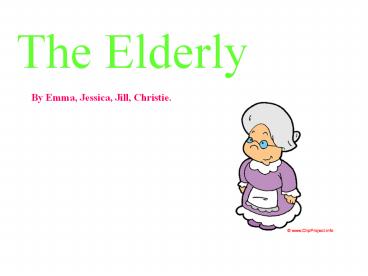By Emma, Jessica, Jill, Christie. - PowerPoint PPT Presentation
1 / 11
Title:
By Emma, Jessica, Jill, Christie.
Description:
The Elderly By Emma, Jessica, Jill, Christie. – PowerPoint PPT presentation
Number of Views:129
Avg rating:3.0/5.0
Title: By Emma, Jessica, Jill, Christie.
1
The Elderly
By Emma, Jessica, Jill, Christie.
2
What do we mean by the elderly?
- Men are classed as OAPs (old age pensioners)
when they reach the age of 65. While women are
classed as OAPs at the age of only 60. - However the changing nature of today means that
people are living well beyond this age. The
average person today can live well over the age
of 70. Some people these days are reaching the
age of 100 years, which is not uncommon in
today's society.
3
Scotlands elderly population by gender 2001.
Results show that women live longer
than men!
4
Health Facts
- 25 of the 85 age group are in long term care.
- 34 of men and 33 of women aged 65-74 have
longstanding illnesses. - 41 of pensioners living in disadvantaged areas
have longstanding illnesses. - 30of pensioners in high income areas have long
standing illnesses. - The most common diseases of old age are
arthritis, heart disease and strokes, also eye
and ear impairments are more common in older than
young people. - The elderly who live in disadvantaged areas have
more difficulty coping with every day activities
such walking, using public transport and
household tasks.
5
Residential Homes
- Residential homes are ran by the local
authorities or private companies and sometimes
voluntary groups e.g churches. - In a residential home the advantages are-
- Try to get more one to one care
- Meals are cooked for residents and there is a
chaise of menu. - A variety of entertainment is available
- Hairdresser visits once per week
- Lounges for family and friends are provided
- Help is provided 24hours a day.
- Residential homes expensive, they can cost as
much as 500 per week which is quite a bit for
old age pensioners. This explains why private
companies open private nursing homes. Many are
ran well and have an expellant standards of care.
6
Nursing Homes.
- Nursing are very similar to residential homes in
the facilities they provide. - Many are ran by private companies but usually
care for people with greater needs for care, this
means they provide a greater level of care 24hour
care from trained nursing staff. - The difference is that they are much more
expensive than residential homes.
7
Standards of living.
- Only 12 of pensioners receive income from
employment. - The elderly get bored in care homes because they
cant get out and they are on there own for most
of the day. - 100,000 people are shut away in care homes in
Britain. - Can go days sometimes months with out getting out
side for something that they want to do. - Single women pensioner are said to be worst off.
- The older generation that are in care homes often
get depressed. - Treated worse in care homes than prison.
8
Standards of living.
- Poorer old people spent a large part of there
income on food (24) than better off pensioners
(16) - Poorer and older pensioners spend less on fuel
to. - Pensioners staying in rented accommodation pay
30 of there income on rent. - 15 of pensioners houses are in a bad state of
repair. - 25 of the worst housing accommodation is
occupied by pensioners. - Single pensioners are more likely than others to
live in houses which are expensive to heat.
9
Sheltered Housing Accommodation
Year Houses
1992 32,192
1993 32,267
1994 33,100
1995 33,687
1996 34,976
1997 35,484
1998 36,069
1999 34,752
2000 35,342
2001 34,615
1002 34,247
Roughly the housing accommodation for the elderly
has improved.
10
This is basically what the elderly do everyday of
every week, they get bored and lonely inside all
day.
11
Thank you for listening to our Power Point.
- By Emma, Jessica, Jill and Christie!































